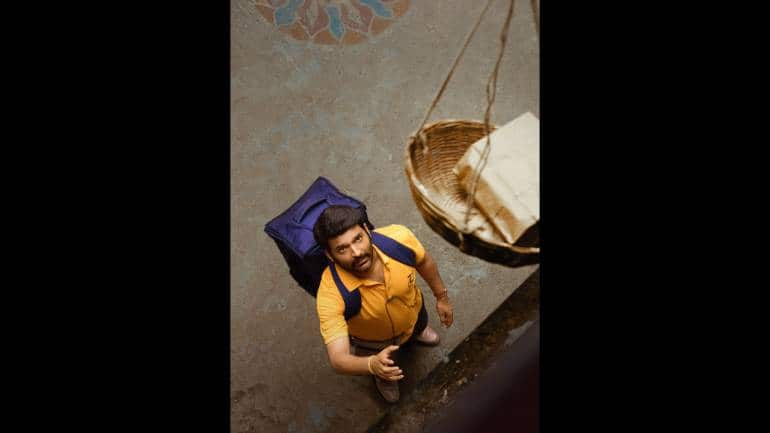



Nandita Das’ third directorial venture, Zwigato, is agitprop filmmaking — the filmmaker’s politics is abundantly clear. It is a relevant film, and an elegant , socially-engaged film, a bit of a throwback to the parallel films that became a movement in the 1970s and 1980s. The screenplay, by Das and Samir Patil, asks for a thought to be spared for the anonymous man who drops our food, our every material need every day. Do you know that this guy is just about surviving, and his human dignity has reached its lowest, it asks. The film even gives out a theme in a succinctly potent leftist rhetoric: “Majboori se majdoor” (“a slave because of compulsion”).
Zwigato has plenty of sympathy for those who are at the mercy of the gig economy. Technology has created jobs with the promise of “be your own boss”, and the film’s lead man Manas (Kapil Sharma) takes that bait after losing a factory job in Jharkhand. He arrives in the newly-bustling Odisha capital Bhubaneswar with his wife Pratima (Shahana Goswami), two children and an ageing, bedridden mother. The family needs a way out. Manas is a delivery rider for Zwigato — something like a Zomato or a Swiggy. He is at his wit’s end: Pushing physical limits, roaming the city aiming 10 deliveries in a day, taking selfies with customers for a bonus, while dealing with his own sense of inadequacy as a man because Pratima decides to pitch in with some work herself — as a masseuse and mall cleaner. The children are smart and blissfully addicted to their parents’ phones, always finding a way to get hold of them. For this family, the phone is the only precious thing they own. Pratima and Manas face continuous bumps in their effort to start anew in the new gig economy — full of promise but not without its own exploitative machinations. That’s exactly Das’s point. The gig economy is not a panacea to India’s problem, it can be as dehumanising to the lowest echelons of employees as any other economy or age would.
 Kapil Sharma as Manas in a scene from 'Zwigato'.
Kapil Sharma as Manas in a scene from 'Zwigato'.
There are a few compelling scenes in the film that brings home the disparity and the lack of respect that workers of the gig economy face every day on the go: Manas lands up at an affluent home with an afterparty scene with 12 boxes of pizzas because of a wrong order — there are strewn bottles, a passed-out human and a couple, who is rude and snide because the rider got the wrong delivery for them. Sharma channels Manas with impressive interiority, maintaining a stifled, stoic persona with occasional outbursts which cost him a lot. Sharma’s ease as an actor is obvious. Manas isn’t yet attuned to the way digital works, and he is clueless that ratings matter more than handwork in his field.
 Shahana Goswami as Pratima in a scene from 'Zwigato'.
Shahana Goswami as Pratima in a scene from 'Zwigato'.
Goswami gets Pratima to the tee — from her get-up of crumpled cotton sarees to how she expresses shame, hesitation and seething anxiety often in the same scene with as much as a turn of the head or blink of an eye. When Pratima reaches a bungalow for a massage after a long commute, she is first shown the lift meant for “worker staff”, silently she dusts her saree and walks in to the left meant for the lesser mortal. Once she reaches the home, she is subtly dismissed because she is sweaty and has “BO”, and the lady offers her a meagre tip which she accepts after initial hesitation. Goswami is the film’s spark — the way her eyes communicate in every scene she appears is electrifying, proving how silence can be electrifying.
Zwigato has many parallels with Ken Loach’s Sorry We Missed You (2019) — a married couple, a delivery rider and a health worker, invisible and trying to get by in the gig economy. Loach, too, never goes for the obvious drama — all his films are through a leftist lens, sympathises with the margins of the big economies. His style is subdued, always without big dramatic moments, but with a propulsive energy organic to plot and denouement. Zwigato almost demands to be compared to Loach-ness, but because of the inert storytelling it is the lesser film.
I went to watch this film with expectations. Set in Bhubaneswar, a city that balances the old (like the beautiful Old Town with its temples) and signposts of the new economy, wide roads and public artworks, the setting has a novelty. One doesn’t always need a Gurugram or a Dharavi to show what class contrasts work in obvious but insidious ways in the new urban megalopolis. A smaller city is often the best instrument to reveal how a global economy works. Some scenes enraptured me, but as the story moved along with insipid sameness and repetitions, it became a drudgery. The maker’s politics was loud and clear, but the story’s lack of organic logic becomes its bane — awkward juxtapositions (a leader’s rousing speech about the need for dignity in the new economy and Manas right at the back row nodding along, without revealing what this speech is making him feel and then straight going to a completely disconnected scene in which it’s obvious that that rally meant nothing to him) and repetitions (a petrol pump worked always giving Manas bad news, crushing, perhaps, his spirit bit by bit) abound in the screenplay. It has an implosive energy that don’t go anywhere — at times, Zwigato even feels like a short film stretched to a feature length. Melodrama or obvious dramatic markers aren’t necessary to wrest a film story’s emotionality, but it needs some interior logic, edge and spark to engage a viewer. Most of the sequences in the film feels hurried. Ranjan Palit’s camera has a fluidity, and it captures Bhubaneswar in staple scenes — the city isn’t a character at all. The technical crew also includes Manas Choudhury as sound designer and Jabeen Merchant as editor — both big names in the industry.
Zwigato is more commentary than filmmaking. A Dalit cameo, a Muslim cameo — joyless and in need of help — are just two small elements that drive Das’s politics. It’s been Das’s uncompromised badge ever since she worked with Marxist playwright Safdar Hashmi before he was assassinated. The worldview alone, even though it’s a worldview that resonates with me, doesn’t make the life of Manas and Pratima provocative or engrossing, and despite an abruptly contrasting, light, uplifting end scene — life and its pain and hustle has to go on, as Ken Loach would also say — Zwigato ultimately feels like a beautiful, relevant idea lost in ill-judged filmmaking.
Zwigato released in theatres on Friday.
Discover the latest Business News, Sensex, and Nifty updates. Obtain Personal Finance insights, tax queries, and expert opinions on Moneycontrol or download the Moneycontrol App to stay updated!
Find the best of Al News in one place, specially curated for you every weekend.
Stay on top of the latest tech trends and biggest startup news.